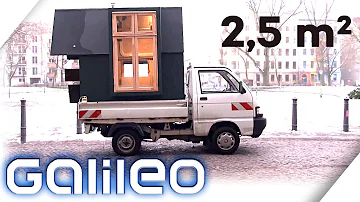Wie groß ist das kleinste Tiny House?
Is it cheaper to build or buy a tiny house?
It's typically cheaper to build a tiny house than to buy one prebuilt, but don't get too caught up in the savings. You may underestimate the job you're taking on by choosing to build yourself, as one small mistake can end up costing extra time and money to fix.

How tall can I build my tiny house?
13.5 feet tall
You can have a tiny house up to 13.5 feet tall. Often trailers are around 24 inches from ground to top of the deck, your sub floor is usually 4 inches thick, your flooring is up to an inch thick, and then your roof will be anywhere from 4-6 inches thick from inside finishes to the top ridge cap of your roofing.
What are 3 reasons people choose to buy a tiny house?
Top 5 Reasons to Buy a Tiny Home
- Lower cost. Tiny homes cost significantly less than a traditional home. …
- More sustainable. …
- Less cleaning. …
- Reduced stress. …
- More time outdoors.
Are tiny homes worth it?
Are Tiny Houses Worth the Investment? Nope. Not if you're thinking of purchasing a tiny home as a long-term investment. But if you're absolutely sold on living small and going tiny, you do you—but don't expect any returns on your investment.
How long do tiny homes last?
With proper maintenance, your home on wheels can last over 30 years. Ultimately, your tiny house is a durable, affordable housing option that can last you a lifetime.
Can you permanently live in a tiny home?
Yes, you can permanently live in a tiny house in California. Quite a few people are doing this, and there are even communities of tiny houses popping up around the state. However, there are a few things to remember if you're thinking about making this permanent switch.
What is the largest size a tiny house can be?
That said, if you really do want a rule of thumb, it would seem that tiny houses usually range between around 60 and 400 square feet. You could possibly extend this range up to around 1000 square feet, but you're venturing into “small house” territory here.
Can a tiny home be 500 square feet?
There's no hard-and-fast rule for what qualifies as a "tiny" home, but they are usually under 500 square feet.
How many years do tiny homes last?
With proper maintenance, your home on wheels can last over 30 years. Ultimately, your tiny house is a durable, affordable housing option that can last you a lifetime.
What are 3 negative features of a tiny house?
Disadvantages of Tiny Houses
- Less Living Space. A tiny house doesn't have room for a full-sized luxury kitchen or bathroom. …
- Less Storage Space. …
- Limited Entertaining Capability. …
- Zoning Rules. …
- Financing.
What are three common problems with tiny houses?
6 Big Problems With Building Tiny Houses
- In a tiny house build, you're going to be thinking a lot about poop. …
- Zoning laws are no little problem for tiny houses. …
- Tiny house builds are not cheap. …
- Obtaining insurance for tiny houses can be difficult. …
- Tiny house occupants need storage space.
Do people regret living in tiny houses?
A whopping 44 percent of participants had housing regrets, and the biggest regret among homeowners had to do with size. One in three homeowners said they wish they had chosen a larger home, compared to only nine percent who wished they had downsized.
Is 1000 sq ft a tiny home?
On Dream Home Source, we define "tiny house plans" as any home design under 1,000 square feet. Homes under 1,000 square feet can and often are used as primary residences.
What are the downsides of owning a tiny home?
Disadvantages of Tiny Houses
- Less Living Space. A tiny house doesn't have room for a full-sized luxury kitchen or bathroom. …
- Less Storage Space. …
- Limited Entertaining Capability. …
- Zoning Rules. …
- Financing.
What is a good budget for a tiny house?
Whether it's built to your specifications or prefabricated, tiny-house cost ranges from $30,000 to $60,000. The national average is about $45,000, approximately in the same price range as a luxury car.
Do people regret living in tiny homes?
A whopping 44 percent of participants had housing regrets, and the biggest regret among homeowners had to do with size. One in three homeowners said they wish they had chosen a larger home, compared to only nine percent who wished they had downsized.
